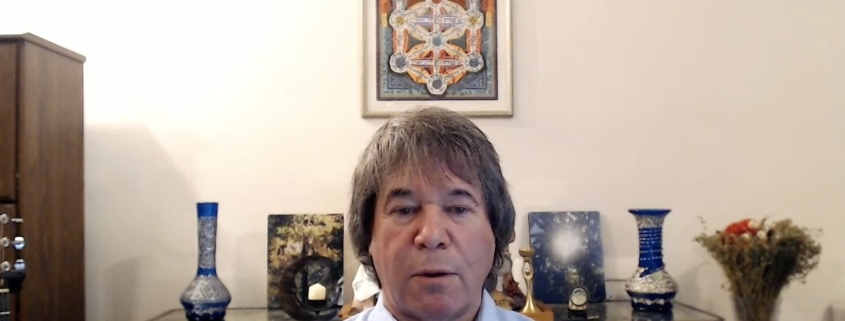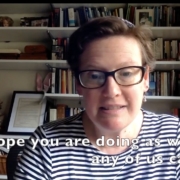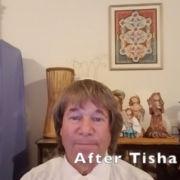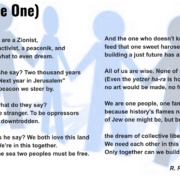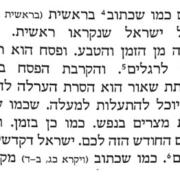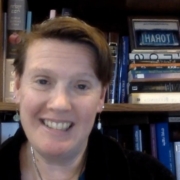Palabras del Torá / a “vort” of Torah from R’ Sunny Schnitzer
Each month Bayit offers regular video “vorts” (words of Torah / teachings from Jewish tradition) offered in or translated into Spanish, designed for Cuban Jewish communities and available to Spanish-speaking Jews everywhere. This month’s video offering features a teaching from Rabbi Sunny Schnitzer. The text follows the video, in Spanish and then in English.
Palabras del Torá / a “vort” of Torah – R’ Sunny Schnitzer from Bayit: Building Jewish on Vimeo.
¡Hola mis amigos!
¡Los extraño tanto! Tenía la esperanza de venir a Cuba el mes pasado, pero la realidad del Coronavirus hizo que los viajes internacionales fueran imprudentes y difíciles. Los judíos estamos familiarizados con las plagas. De hecho, somos expertos porque discutimos y aprendemos sobre las plagas todos los años. Pero, ¿por qué este año es diferente de todos los demás? Porque este año nos enfrentamos a esta nueva realidad.
Oremos para que nuestra situación actual termine pronto.
Continué cada semana aquí en mi comunidad dirigiendo servicios en Shabat y escribiendo sermones e historias. Estoy particularmente enfocado en escribir sermones divertidos para ayudarnos a olvidar por unos momentos nuestras preocupaciones y problemas.
Recientemente, hice una broma en nuestros servicios de Shabat que molestó a algunas personas. La broma fracasó porque ignoró el consejo que he ofrecido muchas veces a colegas y amigos. “Nunca uses el sarcasmo cuando hable en público”. Decir lo contrario de lo que realmente quieres decir no siempre es entendido por todos tus oyentes. El sarcasmo está lleno de peligros y lleva al arrepentimiento.
Los amantes del lenguaje y las palabras a menudo admiran el sarcasmo. Su uso muestra un agudo ingenio e inteligencia. Pensamos en Jonathan Swift y Enrique Vila Matas, que eran maestros del oficio. Nos reímos sinceramente de los comediantes y actores que nos deslumbran con sus lenguas rápidas. Pero no todos aman a Jonathan Swift y no todos “captan” a Soledad Huete en Siete Vidas. Lo que sale de nuestras bocas no siempre está claro.
Una de las libertades para trabajar durante Pesaj es la “libertad de boca”. Nuestros rabinos ven la boca como la parte más peligrosa del cuerpo. Es el único órgano que puede causar problemas en ambas direcciones: lo que entra (comida y bebida) y lo que sale (habla). Es tan peligroso que es la única parte del cuerpo que tiene dos coberturas: dientes duros y labios suaves. La mayoría de nosotros somos esclavos de la boca, tanto en lo que comemos como en lo que hablamos.
En la noche del Seder intentamos reparar esto. En lugar de una conversación mundana, tenemos la mitzvá para hablar sobre el pueblo judío que sale de Egipto para elevar el habla, y la matzá y las cuatro copas de vino para elevar la comida y la bebida.
La estructura del hebreo utilizada en nuestra “Maggid”, nuestra historia, insinúa el objetivo de “libertad de boca”. La palabra Pesaj se puede dividir en dos palabras: Peh Saj, que significa literalmente “la boca habla”. La gran mitzvá de Pesaj es “le contarás esta historia a tus hijos”. Se nos ordena contar la historia del Éxodo durante toda la noche. Y como está escrito en la Hagadah: “Cuanto más cuentes la historia, más serás digno de elogio”.
La palabra hebrea, Paróh, (Faraón, el perseguidor del pueblo judío en la historia de Pesaj) se puede dividir en dos palabras: Peh Rah, “mala boca”.
Nuestra esclavitud en Egipto se caracteriza en la Torá como Peraj, (trabajo difícil) que también puede leerse como dos palabras: Peh Rach, que significa “boca suelta”.
Creo que todos lo entienden, así que ahora cerraré la boca con una bendición.
Que todos nos merezcamos en este Pesaj para liberarnos de la “mala boca” y superar la “boca suelta” donde entra demasiada comida y bebida incorrecta y se escapan demasiadas palabras inapropiadas. Que nuestras reuniones, incluso los pequeños sederim que debemos tener este año por la necesidad de la situación de salud pública que enfrentamos, sean gratificantes y nutritivos para el cuerpo y el alma.
A Zissen Pesaj – Kasher v’sameaj!
Hello my friends!
I miss you so much! I had hoped to come to Cuba last month, but the realities of the Coronavirus made international travel unwise and difficult. We Jews are familiar with Plagues. In fact we are the experts because we discuss and learn about plagues every year. But why is this year different than all other years? Because this year we are faced with this new reality. Let us pray that our current situation will end soon.
I have continued each week here in my community to lead services on Shabbat and write sermons and stories. I am particularly focused on writing funny sermons to help us forget for a few moments our worries and troubles.
Recently, I made a joke at our Shabbat services that disturbed some people. It failed as a joke because it ignored the advice that I have offered many times to colleagues and friends. “Never use sarcasm when engaged in public speaking.” Saying the opposite of what you really mean isn’t always understood by all of your listeners. Sarcasm is fraught with danger and leads to regret.
Lovers of language and words often admire sarcasm. Its use displays a sharp wit and intelligence. We think of Jonathan Swift and Enrique Vila Matas who were masters of the craft. We laugh heartily at comedians and actors who dazzle us with their quick tongues. But not everyone loves Jonathan Swift and not everyone “gets” Soledad Huete in Seven Lives. What comes out of our mouths isn’t always clear.
One of the freedoms to work on during Pesach is “freedom of the mouth.” Our rabbis view the mouth as the most dangerous part of the body. It is the only organ that can cause problems in both direction — what comes in (food and drink) and what goes out (speech). It is so dangerous, it is the only part of the body that has two coverings — hard teeth and soft lips. Most of us are slaves to the mouth, both in what we eat and in what we speak.
On Seder night we attempt to repair this. Instead of mundane conversation, we have the mitzvah to speak about the Jewish people leaving Egypt to elevate speech, and the matzah and Four Cups of wine to elevate eating and drinking.
The structure of the Hebrew used in our “Maggid,” our story, hints at the goal of “freedom of the mouth.” The word Pesach can be divided into two words: Peh Sach, which means literally “the mouth speaks.” The great mitzvah of Pesach is “you will tell to your children this story.” We are commanded to tell the story of the Exodus the whole night long. And as it is written in the Hagadah – “The more you tell the story, the more you shall be worthy of praise.”
The Hebrew word, Paroh, (Pharaoh, the persecutor of the Jewish people in the Pesach story) can be divided into two words: Peh Rah, a “bad mouth.”
Our slavery in Egypt is characterized in the Torah as Perach, (difficult work) which can also be read as two words: Peh Rach, which means “a loose mouth.”
I think you all get it, so I will now close my mouth with a blessing.
May we all merit on this Pesach to free ourselves from the “bad mouth,” and to overcome the “loose mouth” where too much of the wrong food and drink come in and too many inappropriate words slip out. May our gatherings, even the small sederim we must have this year by necessity of the public health situation we face, be rewarding and nourishing to body and soul. A sweet and kosher Pesach to all.
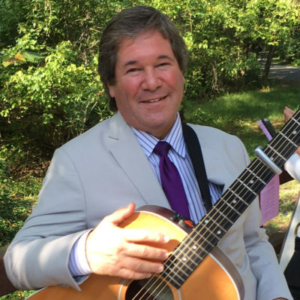
By Rabbi Sunny Schnitzer.

